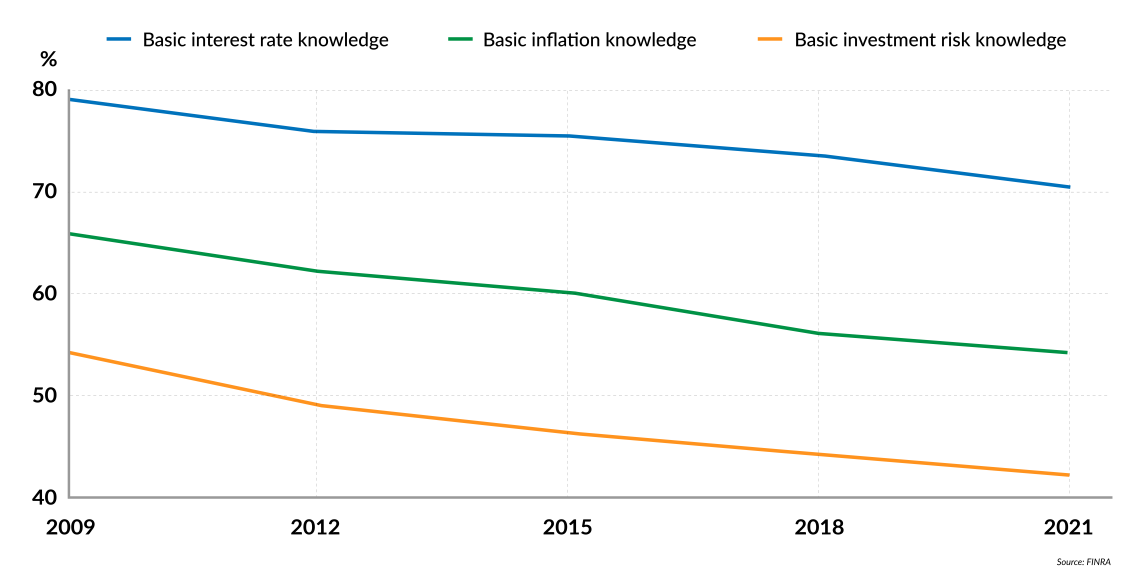The evils of financial illiteracy
A growing number of people struggle to understand basic economic concepts, putting them at risk in both personal and civic spheres.

In a nutshell
- A significant proportion of Europeans and Americans is financially illiterate
- Spiraling poverty awaits many citizens in such circumstances
- Uninformed voters will likely make self-defeating choices
Given the state of the world today, one could not be blamed for thinking that there are more pressing matters to worry about than some people’s inability to grasp the concept of compound interest. Inflation, economic uncertainty, heightened social friction and new technological (and possibly existential) threats like Artificial Intelligence all seem more urgent.
However, there is an argument to be made that most, if not all, of these problems and dangers at least partially stem from the scourge that is financial illiteracy.
Ignorance is bliss?
According to a recent Eurobarometer survey published in July 2023, “only 18 percent of European Union citizens have a high level of financial literacy, 64 percent – a medium level, and the remaining 18 percent – a low level. There are, however, wide differences across member states. In only four Member States, more than 25 percent of people score highly in financial literacy (the Netherlands, Sweden, Denmark and Slovenia).” The gap was even more pronounced among certain demographic groups, namely “women, younger people, people with lower income and with lower levels of general education who tend to be on average less financially literate than other groups.”
These figures may not seem alarming at first – until one dissects what the researchers defined as a “high level of financial literacy.” When assessing financial knowledge, the participants were deemed “top of the class” if they could answer four out of five basic questions correctly, with questions ranging from “(do you) understand that an investment with a higher return is likely to be more risky” to “(do you) understand the link between interest rates and bond prices.” Only 20 percent of those surveyed in total got the second one right.
In the United States, the level of financial literacy is even lower. Research by the Financial Industry Regulatory Authority (FINRA) showed that approximately two-thirds of Americans cannot pass a basic test with questions on simple concepts like inflation and interest, similar to those posed by Eurobarometer.
Facts & figures
Financial literacy levels in the United States

As might be expected, this lack of understanding of finance, basic economic concepts and even elementary math has a very real and direct impact on financially illiterate individuals and their families. As the latest National Financial Educators Council (NFEC) report highlighted in April, the average American lost $1,819 to personal financial errors last year. The main traps for those on the lower end of financial literacy are credit card interest rates and fees, which cost consumers $120 billion in 2022.
With interest rates higher now, these mistakes have become costlier and costlier. Overdraft fees are another popular black hole for a lot of people’s money: “Americans spend $17 billion a year on overdraft and non-sufficient funds (NSF) fees,” according to the Consumer Financial Protection Bureau (CFPB).
Far-reaching implications
The damage that financial illiteracy can inflict on those who suffer from it is obvious. A lifetime of financial woes, struggling to make ends meet and living from paycheck to paycheck is the most common scenario, but it can get a lot worse. With no rainy-day funds to act as a buffer in cases of unforeseen expenses, getting laid off or even having a medical emergency can easily lead to spiraling debt. Descent into real poverty is a common outcome for many people in such positions, which in turn often leads to social marginalization, generational disadvantage and social immobility. As a result, the next generation is often denied a quality education and the opportunity to acquire financial literacy for themselves, which feeds into a vicious cycle.
The consequences, however, do not affect the individual and their families alone. Financial illiteracy, especially when it is this prevalent in any society, effectively kneecaps the democratic system itself and virtually guarantees that real growth and prosperity will forever remain elusive.
Put simply, if the majority of voters cannot decipher and assess basic metrics and understand fundamental concepts like interest rates, consumer price inflation figures, government budgets, money creation and monetary policy decisions and interventions, how are they supposed to make an informed, rational choice come election time?
In fact, as a 2020 survey showed, the majority of Americans do not understand how banks work: “38 percent of respondents believed that banks had to have the exact amount of customer deposits in their reserves at all times.” Most of those who had heard of fractional reserve banking had no idea about the true extent of it.
If the body politic as a whole has little to no grasp over even the simplest principles of money creation and fiat money in general, what is to stop any voter from being lured in by populist agendas and “free lunch” promises by politicians? Under these conditions, ideas based on the lowest common denominator, instant gratification and low time preference are bound to emerge victorious every time.
Voters are left defenseless. In this context, it is not surprising that misguided concepts like Modern Monetary Theory and Universal Basic Income are gaining traction. In a world where, until recently, negative interest rates were the norm without any public resistance or at least apprehension, anything goes.
As for the leaders themselves, their motives for peddling easy solutions to complex problems are clear (that is, populist promises get the popular vote), but not much else about their reasoning is. It could be that political and institutional leaders fully realize and eagerly exploit this knowledge differential and take advantage of the public’s lack of understanding to advance their own interests.
More by Vahan P. Roth
The promise and peril of Worldcoin
The CBDCs are coming: Should we worry?
However, it is also possible that they are merely the product of the same education system that deprived their fellow citizens of financial literacy and simply do not know any better. To the more cynical reader, mere ignorance might sound like an excessively charitable explanation. However, there is evidence to support it.
A survey from 2017 by Dods Political Intelligence showed that Members of the British Parliament are just as clueless about money creation as the average citizen, if not more: “Only 15 percent of MPs were aware that new money is created when banks make loans, and existing money is destroyed when members of the public repay loans. Sixty-two percent thought this was false, while 23 percent responded “don’t know.” Tory MPs seemed to have a slightly better idea, with 19 percent answering correctly, compared to only 5 percent of Labour MPs.”
Possible outcomes
Assuming that nothing changes in the education system and that most schools continue to treat financial literacy as a nonessential skill, there is no reason to hope that we will escape this vicious cycle. Schools will continue to produce financially illiterate citizens who will continue to support misguided policies that will keep corroding the economy and society at large.
We have already seen this deterioration accelerate over recent decades. Falling living standards, debt, inflation and financial troubles of all kinds have gotten severely worse, and this has translated into socio-political strife. The poorer people get, the angrier they become, and this inevitably culminates into the extreme political polarization we are seeing across the West.
There is also a real risk that financial illiteracy can be further weaponized to push all kinds of dangerous policies through. For instance, selling the idea of central bank digital currencies (CBDCs) and the elimination of cash is much easier when the average voter does not realize the threat of direct monetary policy transmission. The same goes for government spending. Defense budgets can skyrocket ever more and “forever wars” can be financed without much pushback. When the public does not understand what a deficit is and how it affects them, or what debt servicing costs mean for them, anything goes. New taxes for the rich and for corporations to “pay their fair share” are also a debate-winning proposal, when citizens do not see the full impact on the economy.
To end on a positive note, however, there is a glimmer of hope to be found in the developments in the fintech and crypto spaces. Many of the personal finance apps, new trading platforms and other modern tools that are widely used by the younger generation have financial literacy lessons built in, directly and indirectly. Not only do they offer an abundance of information and resources, but they also encourage budding amateur investors to “learn on the job.” It can be something of a double-edged sword, as uninformed and unprepared individuals stand to learn very expensive lessons by losing amounts they cannot afford. However, these losses also motivate many aspiring traders to do their homework and get a better understanding of fundamental finance principles.
The rise of crypto has also served to educate countless investors about the vulnerabilities of “old money.” Without a doubt, there is a lot of speculation and institutional interest in crypto. By and large, most individual investors have chosen Bitcoin and its peers over fiat money precisely because they understand how the latter is created, how it is abused and how unfit for purpose the entire monetary, financial and banking system really is.
For industry-specific scenarios and bespoke geopolitical intelligence, contact us and we will provide you with more information about our advisory services.








